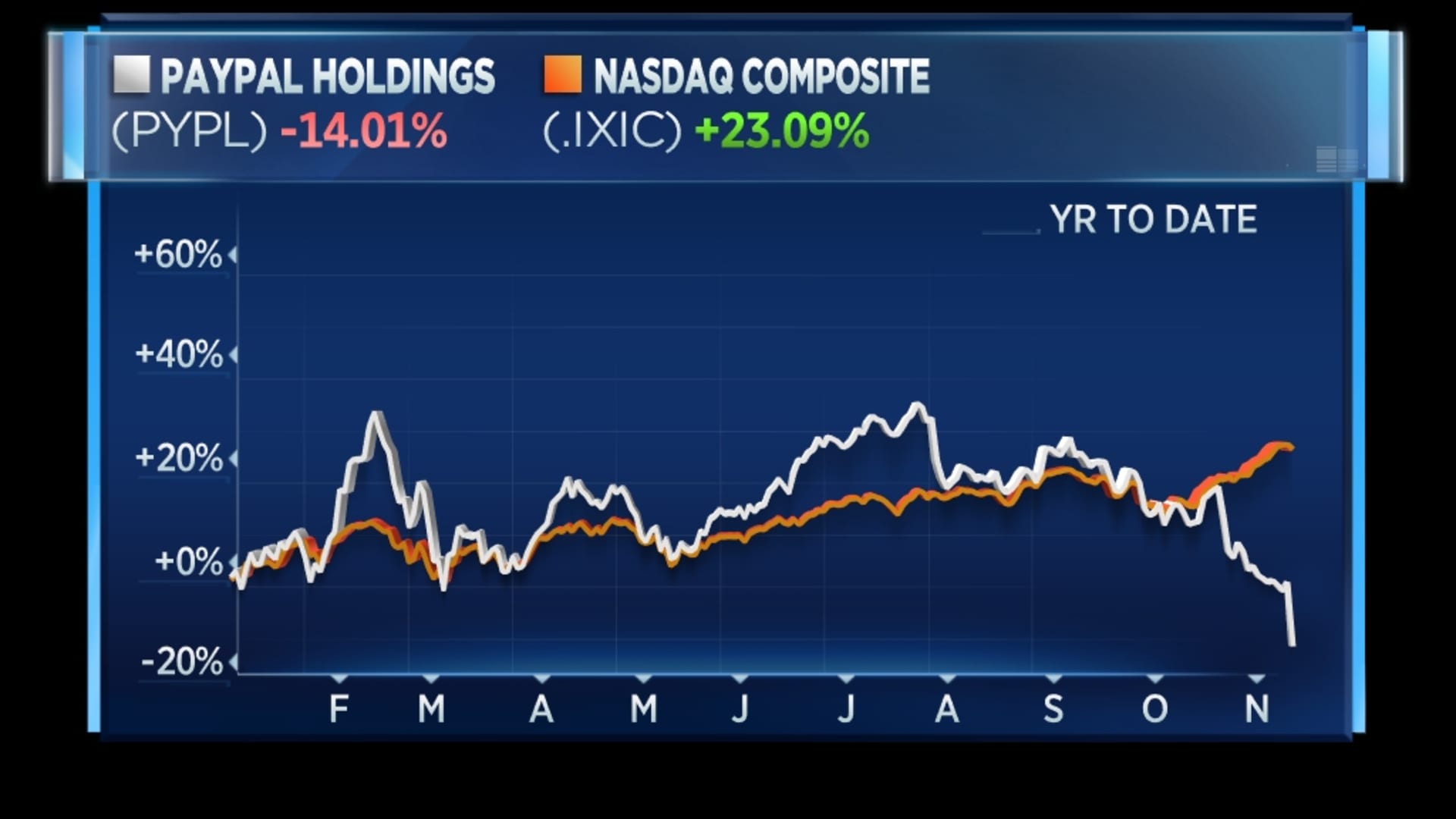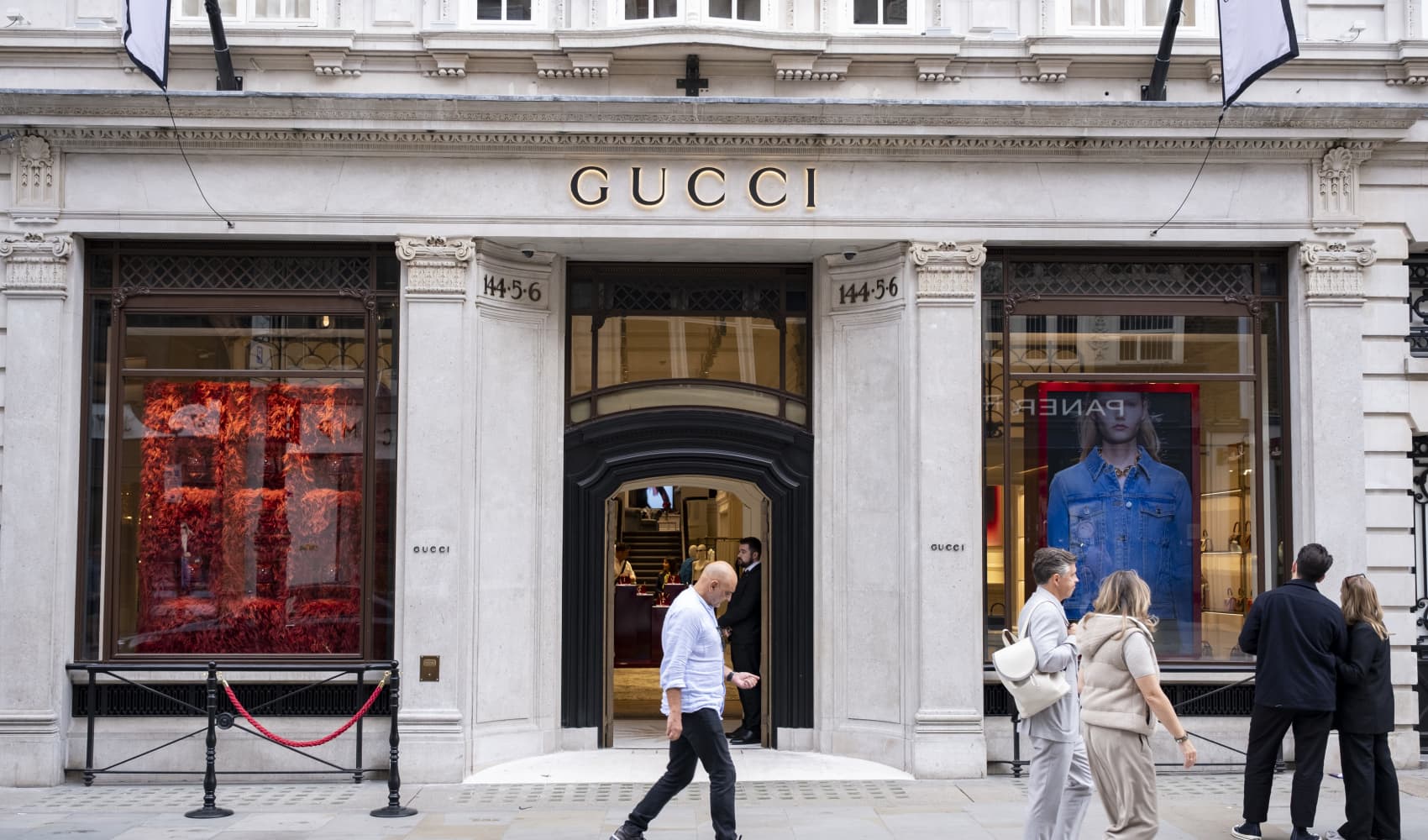
- PayPal shares plunged 12% after the payments company gave a revenue forecast that came in well short of analysts' estimates.
- It's the biggest drop for the stock since the early days of the pandemic in March 2020.
- PayPal investors are focusing more on the company's guidance than on an announced partnership between Venmo and Amazon.
PayPal shares plunged the most since the early days of the pandemic on Tuesday, after an earnings report in which the company cited consumer spending concerns and offered disappointing sales guidance for next year.
The stock was off more than 11% as of early afternoon in New York. It's the steepest decline since March 16, 2020, when the spreading Covid-19 pandemic was forcing businesses to close down and cities and states to impose lockdowns, driving the worst day for the U.S. stock market since Black Monday in October 1987.
Investors initially cheered PayPal's third-quarter earnings report, not because of the results, but because of a partnership the company announced between its Venmo payment app and Amazon. Starting next year, PayPal users will be able to make purchases on Amazon.com and the Amazon mobile shopping app with their Venmo accounts.
Get New England news, weather forecasts and entertainment stories to your inbox. Sign up for NECN newsletters.
However, that optimism quickly faded during the earnings call, when PayPal CEO Dan Schulman gave guidance for next year. The company said revenue for fiscal 2022 will increase about 18%, which would equal full-year sales of close to $30 billion. Analysts were projecting revenue of $31.6 billion, according to Refinitiv.
"We are seeing the impact of global supply chain shortages in our merchant base, consumer confidence is weakened with the absence of stimulus payments, and with the economy reopening, more people may be likely to do their holiday shopping in-store," Schulman said on the call.
PayPal had already missed estimates on third-quarter revenue and lowered its forecast for the current year.
The stock surged during in 2020 as consumers turned to e-commerce during the height of the pandemic. It's now down 14% in 2021, while the Nasdaq is up 23% for the year. Investors started turning bearish on PayPal last month following reports that the company was in late-stage talks to acquire social media app Pinterest.

PayPal later said that it wasn't looking to buy Pinterest. Schulman addressed the matter on Monday's call, without naming Pinterest.
Money Report
"Exploring all potential opportunities to enhance shareholder value is our responsibility," he said. "But obviously, only a select few deals will meet our very strict financial, strategic and capital allocation criteria."
Multiple analysts lowered their price targets after the call.
"PYPL was one of the pandemic's biggest beneficiaries, but the uneven global macro recovery amid supply chain issues as well as tough comps are challenging growth prospects," wrote analysts at D.A. Davidson, in a note to clients on Tuesday.
The firm maintained its buy rating on stock while lowering its price target on to $275 from $325. The shares are currently trading around $201, their lowest in close to a year.
JMP Securities also held its buy recommendation, but lowered its target to $260 from $300.
"Our sense is that management may feel a bit snake bitten (as many have) by the abrupt turnaround in demand in many sectors, especially travel that accompanied the Delta variant surge," the JMP analysts wrote on Tuesday.
They said the headwinds appear "transitory," extending just through early next year, and described the Amazon deal as a "potential game changer."
In addition to macroeconomic concerns, PayPal is preparing for an eBay-less future. Six years after the companies split apart, eBay is in the process of transitioning sellers off PayPal and onto its own payment system. PayPal said volume on eBay marketplaces dropped 45% in the quarter and now represents less than 4% of revenue.
In a report after PayPal's results, analysts at Wedbush Securities reduced their price target to $240 from $330, in part because they said the "eBay transition continues to impact healthy metrics." They maintained their buy rating on the stock.
— CNBC's MacKenzie Sigalos contributed to this report.






